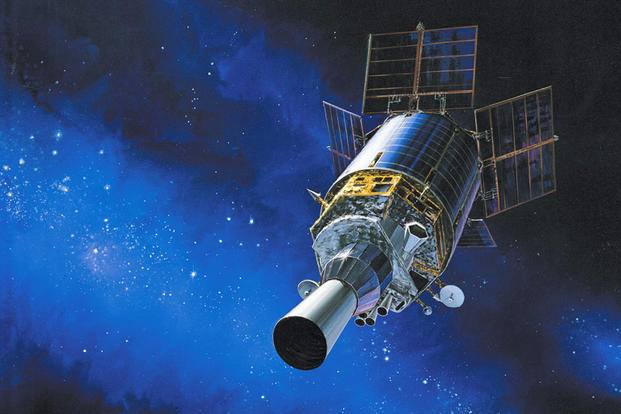 A painting of a Defense Support Program satellite from the Air Force Art collection. DSP provides a variety of national security capabilities. Its flagship mission of launch detection was made famous during the Cold War.
A painting of a Defense Support Program satellite from the Air Force Art collection. DSP provides a variety of national security capabilities. Its flagship mission of launch detection was made famous during the Cold War.
Weapons capable of jamming or destroying U.S. military and commercial satellites will reach initial operational capability in the next few years, according to a new intelligence report.
According to the "Worldwide Threat Assessment" authored by National Intelligence Director Daniel Coats, the space domain will become ever more congested as hostile actors launch weapons into orbit.
"Both Russia and China continue to pursue anti-satellite (ASAT) weapons as a means to reduce U.S. and allied military effectiveness," the Feb.13 report states.
"Russia and China aim to have nondestructive and destructive counterspace weapons available for use during a potential future conflict," the report continues. "We assess that, if a future conflict were to occur involving Russia or China, either country would justify attacks against U.S. and allied satellites as necessary to offset any perceived U.S. military advantage derived from military, civil, or commercial space systems."
However, the U.S. military is already budgeting to shore up defenses against such attacks.
The report follows this week's release of the fiscal 2019 defense budget request, in which the Pentagon makes space a top priority.
The Air Force -- the leader in space among the services -- is requesting a 33 percent increase in its research, development, test, and experimentation budget for space.
There will also be a more robust and realistic training regimen for space airmen "as we shift to space as a warfighting domain," Air Force Secretary Heather Wilson said Friday.
Wilson made the remark during a briefing on air and space power during an Air Force Association Mitchell Institute for Aerospace Studies breakfast in Washington, D.C.
She highlighted the latest budget request’s focus on building more jamming-resistant GPS satellites, improving space situational awareness, and increasing the nation's ability to defend its most vital assets in orbit.
The Air Force is "developing the ability to defend our life's vital, national assets in our orbit, and defeat any attack against them," Wilson said.
The service will also focus on protecting existing satellite communication systems, she said.
These events come the same week as the service put out a request for proposal for a full and open competition for 22 new GPS-3 satellites capable of withstanding electronic attack.
Last year, Wilson noted challenges posed by Russia and China, which could stifle warfighting operations on Earth with offensive or defensive maneuvers in space.
"Ever since we've been involved in space, it was a benign domain," she said at the Center for Strategic & International Studies in October. "But in 2007, that all changed when China launched an anti-satellite weapon."
The launch took out one of China’s own weather satellites and sent thousands of debris particles into orbit.
"It became very clear it was going to become a contested domain. Our adversaries know how much the U.S. depends on its space system. When it comes to communications, indications and warning, intelligence and being able to watch the world -- position, navigation and timing," she said.
Some individuals will enter space for peaceful purposes; some will not.
The United States "has to assume" there will be "both kinds of actors" in space, she said.
No comments:
Post a Comment